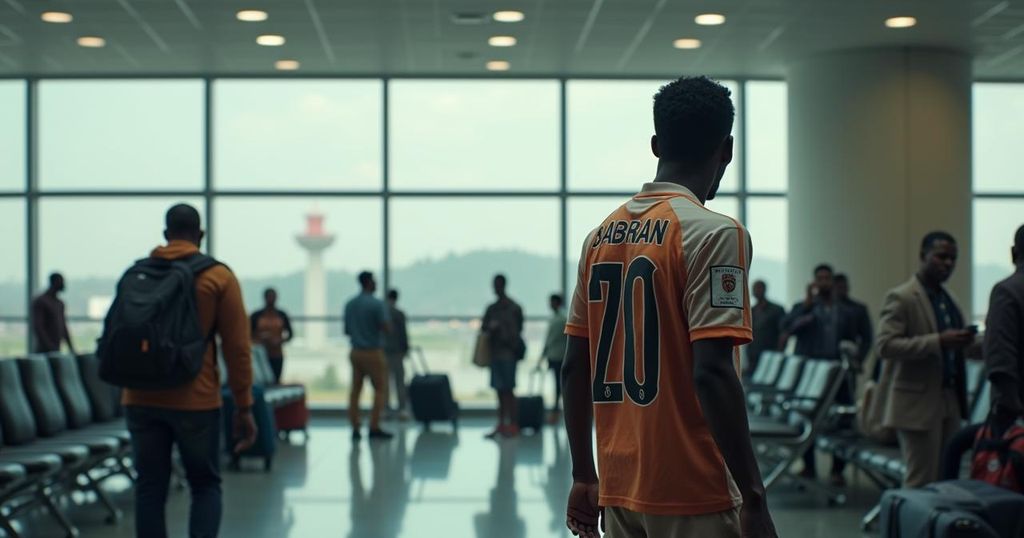Leicester City’s Wilfred Ndidi has reported that the Nigerian football team is effectively being held hostage at Al-Abraq Airport in Libya after their flight was diverted. The Super Eagles players have been stranded for over 12 hours without food or water, asserting that this is a tactic by the Libyan government stemming from prior hostile treatment. The team has stated their intention to boycott the upcoming match against Libya unless their situation is addressed.
Leicester City midfielder Wilfred Ndidi has voiced serious concerns regarding the predicament faced by the Nigerian national football team, claiming they are effectively being held captive at Al-Abraq Airport in Libya. This alarming situation arose when the Super Eagles’ flight, intended for Benghazi, was instead diverted to the aforementioned airport, allegedly closed to international flights. According to the players, they have been stranded without sustenance for over twelve hours, which they believe is a deliberate ploy by the Libyan authorities to hinder their participation in an upcoming Africa Cup of Nations qualifier against Libya. The players have expressed their frustrations through social media, making it clear they feel that their national team is being treated disgracefully. In an Instagram post, Ndidi remarked, “This is not football. Very embarrassing. Hostage to a national team. Disgrace.” Meanwhile, Victor Boniface, who currently plays for Bayer Leverkusen, echoed the sentiments of his teammates in a Twitter message, stating, “Been at the airport for almost 13 hours no food no wifi nowhere to sleep African we can do better.” William Troost-Ekong, formerly of Watford and now competing in Saudi Arabia, elaborated further on the situation in a detailed thread on X. He reported that upon descending, the Libyan government abruptly rescinded their landing clearance for Benghazi. He continued to outline the deplorable conditions they were enduring, highlighting the lack of food, drink, and communication, invoking a sense of psychological warfare from the Libyan authorities. He asserted that the Nigerian team would boycott the match if these issues remain unresolved, saying, “At this point we have called for our Nigerian Government to intervene and rescue us.” It has been suggested that their plight may have resulted from prior complaints regarding their treatment in a previous match against Libya, prompting serious questions about the integrity and safety of national team fixtures in regions undergoing political instability. The current predicament has drawn attention to the broader issue of national teams facing unnecessary and dangerous obstacles while competing abroad. As the situation remains ongoing, the Nigerian football team’s dedication to mutual respect and fair play is evident as they express their unwillingness to engage in an environment that undermines these principles.
The African Nations Cup is a highly competitive tournament, involving national teams from across the continent. Traveling for international matches, especially from countries with complex political landscapes like Nigeria and Libya, can often present unforeseen challenges. In this instance, the Nigerian team faces significant hurdles that underscore the larger issues surrounding safety and treatment of teams in host countries. Cases of hostile treatment towards national teams have arisen in the past, sparking debates about the safety and fairness of international fixtures, particularly in politically unstable regions. The players’ claims of being stranded without basic necessities raise serious ethical concerns regarding how national federations ensure the welfare of their teams during travels.
In summary, the dire circumstances experienced by the Nigerian national football team in Libya highlight both the risks associated with international sporting events and the implications of political tensions on fair play. The players’ demand for government intervention reflects their resolve to address these serious grievances, emphasizing that respect for the integrity of sport should take precedence. Whether the Nigerian team will ultimately proceed with their match against Libya remains contingent upon their conditions improving and the intervention of local authorities. Furthermore, consistent measures must be established to protect players’ rights and dignity worldwide.
Original Source: www.mirror.co.uk






